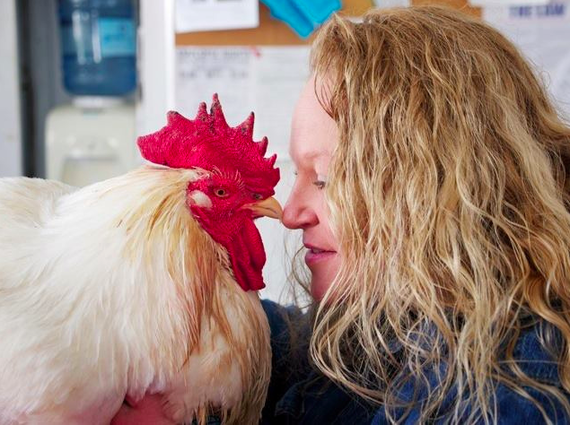Last week, New York Times' food writer Mark Bittman, author of Vegan Before 6, wrote a cautionary op-ed piece about salmonella in chicken, chastising both the USDA and Foster Farms, the producer responsible for a recent salmonella outbreak, for their astonishing disregard of consumer safety. Until the USDA can "get its act together and start assuring us that chicken is safe, I'd be wary" of eating it, he wrote.
Last spring, I attended "An Evening With Mark Bittman" to benefit the Brooklyn Food Coalition. Bittman's presentation encouraged us to reduce our consumption of meat and dairy in order to get healthy, help the planet and reduce animal suffering. After showing slide after slide of animals enduring torture, suffering and terror, Bittman closed by saying something like, "All that matters is that you eat less meat and dairy than you do now."
Perhaps if you're a self-centered human, eating fewer chickens is "all that matters." But what if you're a chicken? What if you're Earth, desperate for humans to be more responsible stewards? After all, eating a plant-based diet saves not only animals but precious natural resources that humans are using up at an unsustainable rate in order to produce cheap meat.
On Sunday, the Times featured a second column on chicken, this one by Pulitzer Prize-winning journalist Nicholas D. Kristof. Kristof recounted childhood experiences with "noble geese" who followed their lifelong mates to the chopping block, courageously honking as their companion's life was taken. "There's another reason to avoid poultry," he writes in reference to Bittman's column, "and that's the inhumane way birds are often raised." Kristof discussed scientific findings on chicken intelligence, and then, harkening back to his childhood, concluded:
just as we try to protect dogs and cats from undue suffering... it makes sense to minimize animal suffering more broadly when we can. So even when there are no salmonella outbreaks, there are good reasons to keep away from wretched birds raised in factory farms.
It interests me that Kristof, lauded around the world for his work giving voice to the voiceless, eats animals despite understanding them as individual beings with unique personalities and preferences, and despite the fact that that the chicken is unquestionably the being in greatest need of a powerful advocate such as he.
In a blog promoting his column, Kristof writes that he is not qualified to discuss whether "birds are lesser than mammals." I believe I am, as are many others whose lives center around providing environments in which they thrive.
As surely as you can describe the differences among members of your family, "sanctuary people" share stories of individual chickens they know. At Catskill Animal Sanctuary, for instance, we share stories of Barbie, the hen who rejected the companionship of other chickens in favor of that of a wise old sheep. We share stories of the breathtaking friendship between a rooster named Hank and his human friend Jenn. We share stories of jealous chickens having to go to "time out" for misbehaving, and of chickens saving others lives. Kristof is right: There's abundant scientific research that confirms the intelligence of chickens. But at animal sanctuaries, there is chicken story after chicken story more rich, more nuanced and more "real" than scientific experiments. Chickens are not "lesser" than mammals. We use the term because it serves our selfish purposes to do so.
Paulie the rooster came to Catskill Animal Sanctuary after three years of confinement in a dog shelter. During his time with us, the former cock fighter ate lunch with staff, demanding each day that a staffer named Alex share his sunflower seeds. If Alex had not brought sunflower seeds on a particular day, Paulie was beside himself, squawking, flapping his wings and jumping up and down, saying in no uncertain terms, "What's the problem here, dude? I'm waitin'!" Paulie quickly learned the sound of my car, charged to my car door when he heard it, squawking and hopping up and down like a lunatic, wanting a car ride. Paulie loved sitting in my lap and driving around town! He befriended my dog, courageously broke up pig arguments, and more. The best-known Paulie story, however, is of a night when I found him shivering in the barn. I loaded a crate with straw and headed to my house, the red rooster tucked under my arm. I placed him in the cozy crate, put the crate in the dining room, and headed to bed. Without recounting the entire story, I'll tell you that Paulie wouldn't shut up until I placed him on a stack of plush towels right next to my head, where I found him the next morning. He hadn't moved a single inch. Years later, as I held him in my arms as he was dying, my friend Paulie rubbed his tiny head back and forth against my arm -- over, and over and over, saying goodbye and telling me he loved me.
And he is but one of many remarkable chickens I have had the privilege to know.
Stories like these and the ones Kristof recalls from his boyhood are neither sentimental nor anthropomorphic, as he worries they might be. They are simple, pure truths that make us uncomfortable by challenging our assumption that eating animals has no ethical implications. "If this is who they are," these stories ask, "should I really be eating them?" Kristof has built his distinguished career on giving voice to the voiceless, from his coverage of China's pro-democracy movement after Tiananmen Square to the genocide in Darfur to Half the Sky, a new book co-authored with his wife that examines the oppression of women. I hope that he will soon turn his attention to the most voiceless of all: the 150 billion animals grown or caught around the world each year to feed a human population of seven billion. From where I sit, it is a genocide like no other, in desperate need of a voice such as his.
